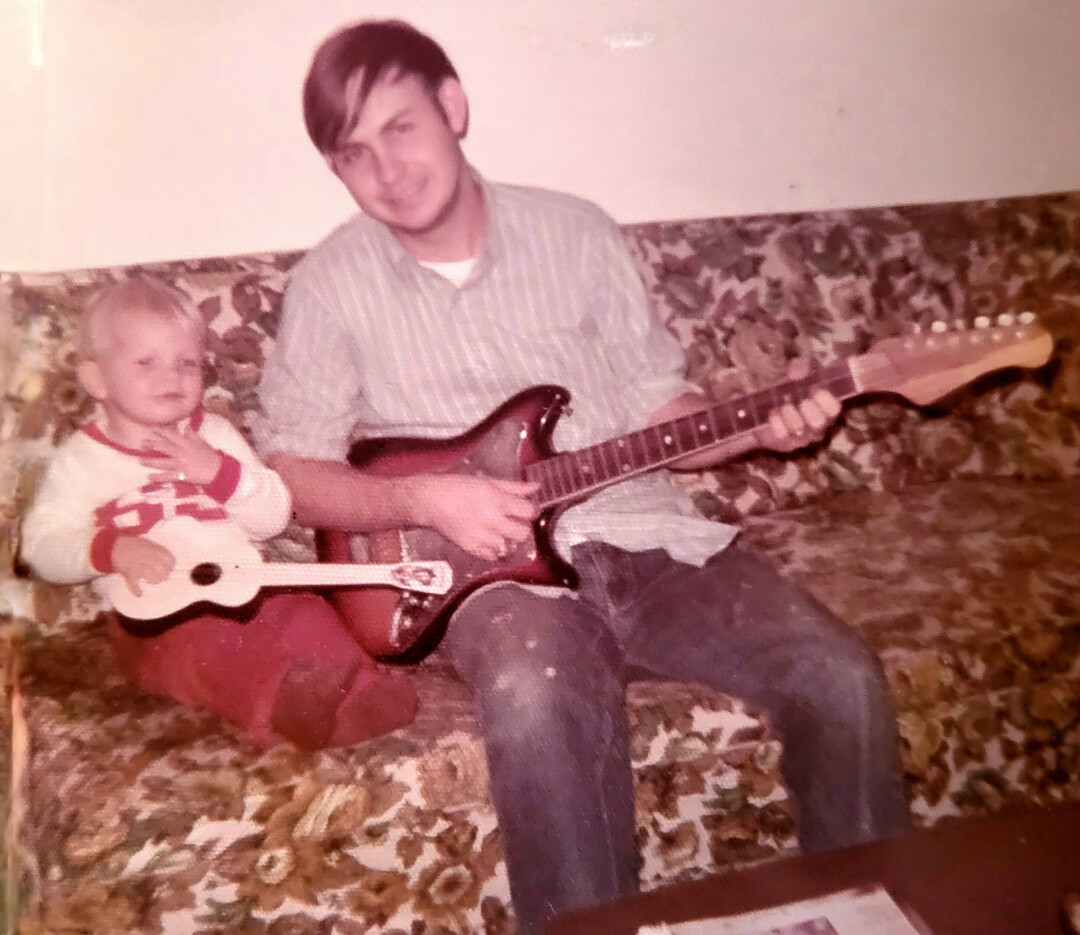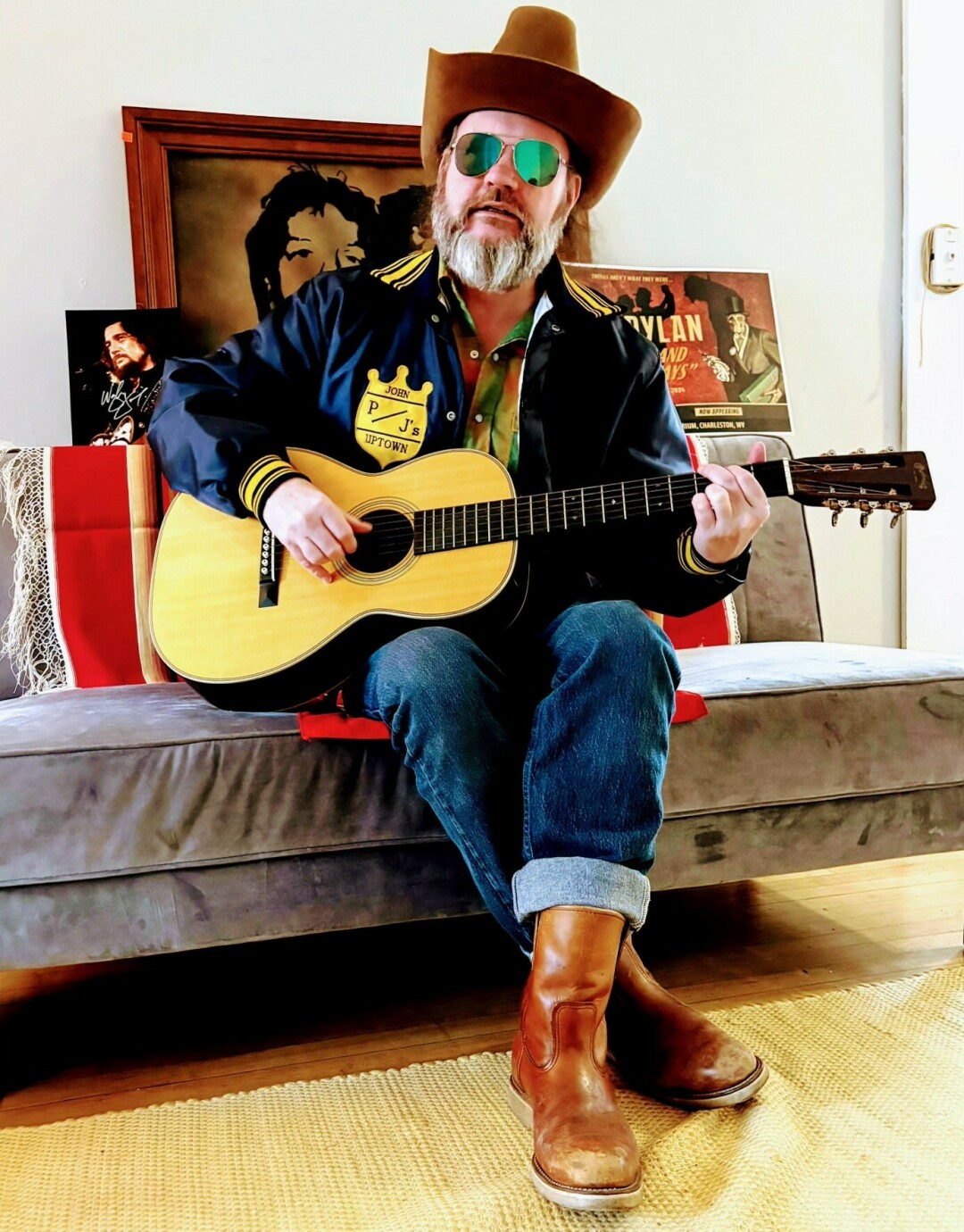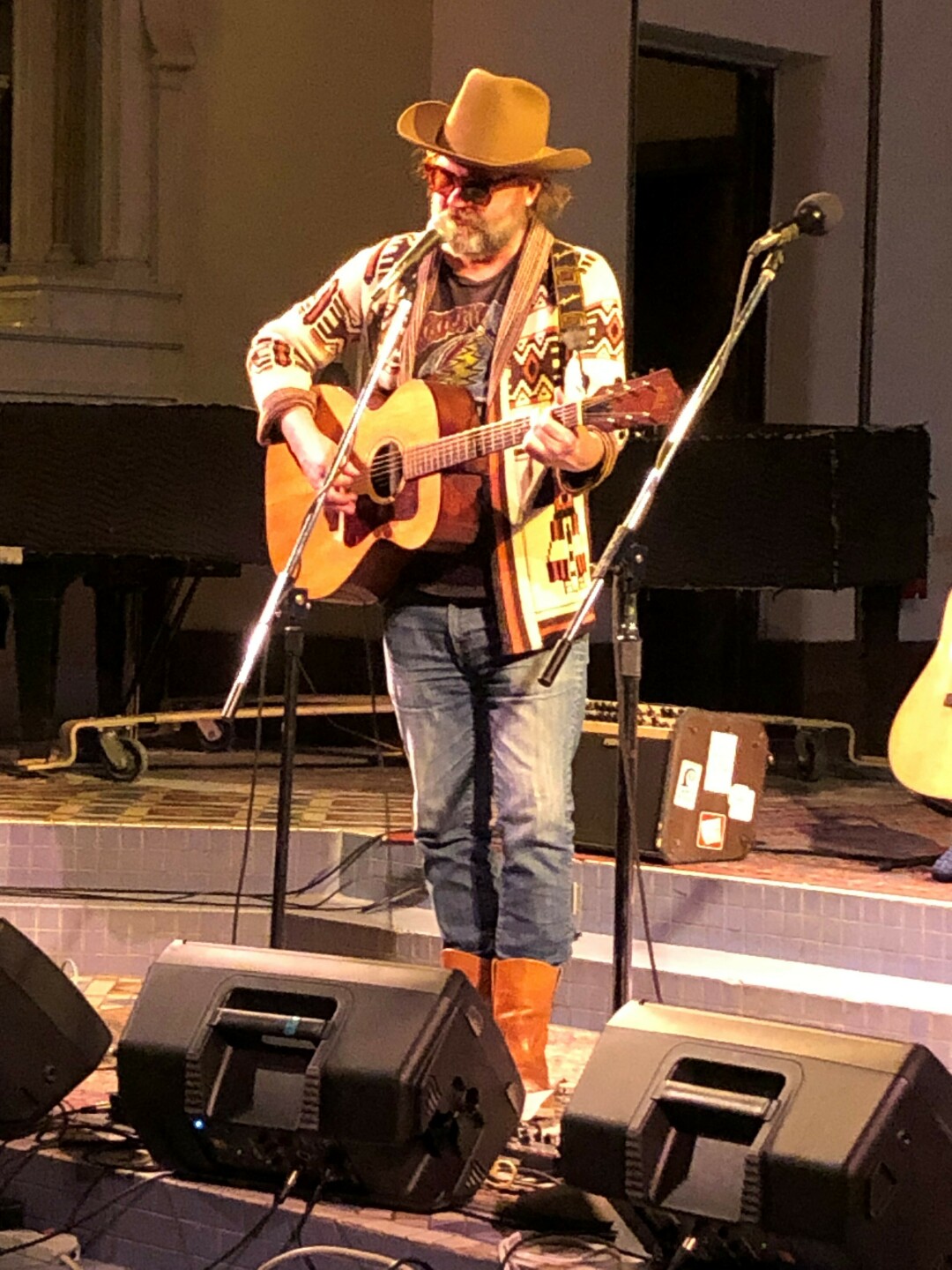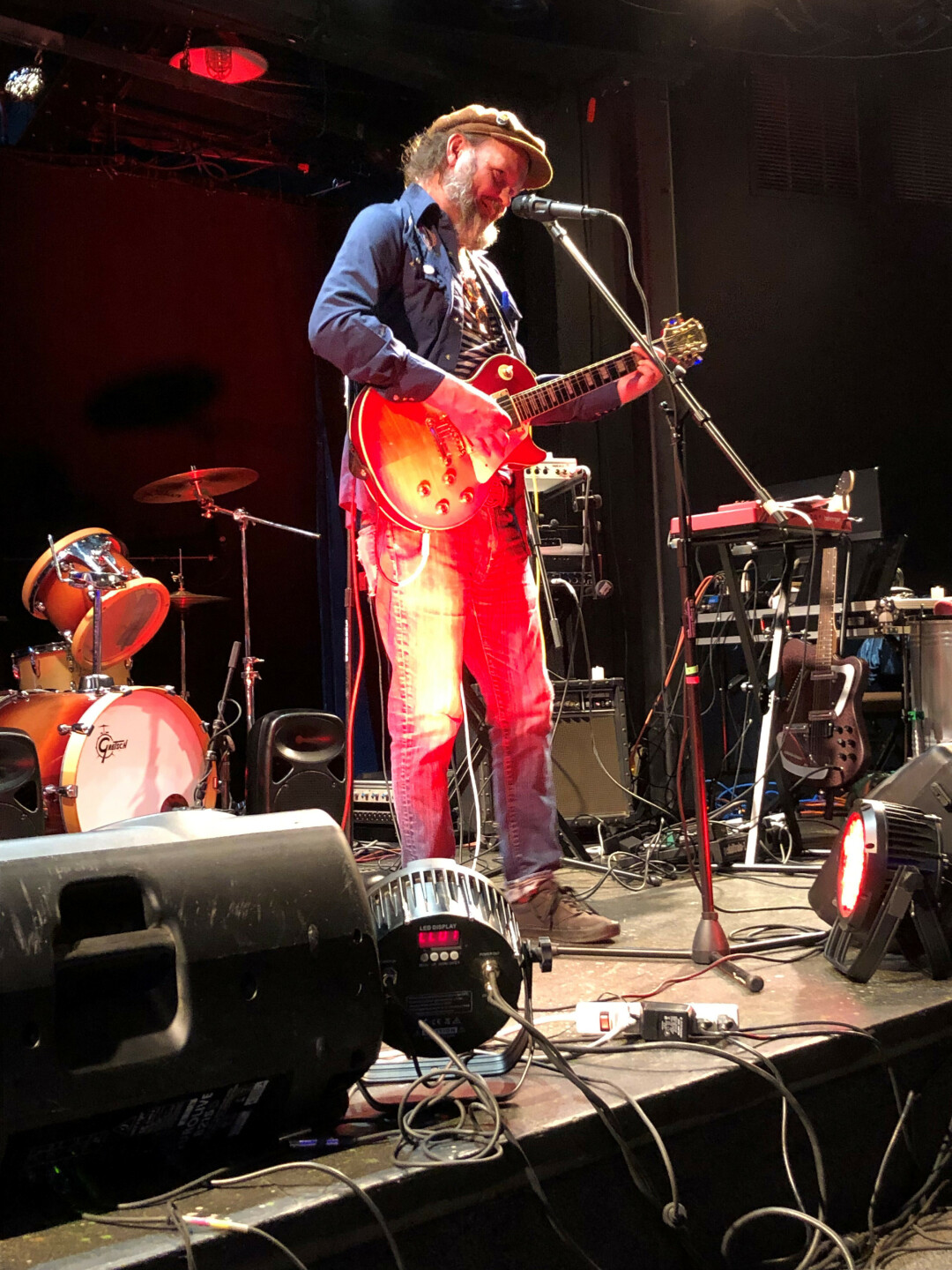A musician’s journey – Misisipi Mike Wolf

Little Misisipi Mike with dad, Jim Wolf, c. 1973.
When music plays a central part of a person’s life, it may take him or her to strange places (think bluesman Robert Johnson) to meet different people and have spontaneous (perhaps fated?) adventures.
The road may be smooth or rocky but through it all winds a connection to something universal, something that weaves the tapestry of life together. So it seems to me a person who follows the path to become a musician can be seen as a hero in the vein of Joseph Campbell’s The Hero’s Journey.
Misisipi Mike Wolf’s musical career is a case in point of following one’s bliss.
Mike was born on New Year’s Eve in Naples, Florida. His mother, Debbie Wolf, reports that he must have been born singing because the nurse brought him into her to be fed saying he was waking up all the other babies. Two weeks later his father, Jim Wolf, brought Debbie and Mike to the Keesler Air Force Base in Biloxi, Mississippi, where he had just been stationed. After being discharged from the military, the senior Wolf got his teaching certificate and the family settled in Pass Christian, Miss., on the Gulf Coast just an hour’s drive from New Orleans.
This would have been fortuitous for anyone destined for a musician’s life – growing up within the influence of that particular city.
Music was everywhere in Mike’s childhood home – radio music was on almost constantly, his mom loved to sing (a favorite song they’d sing together was “This Little Light of Mine”) and his dad played keyboards in a garage band that played covers of songs of that era. Tunes by the Beatles, the Rolling Stones, Jimi Hendrix, Vanilla Fudge and John Prine, etc. were imprinted on him at a tender age.
His parents say that by age two Mike had his own little plastic guitar. The elder Wolf taught his son a few chords on his own basic Sears electric guitar, which Mike had begun picking up and playing around with. His mom described him as a quiet and shy youngster who spent hours in his room playing guitar. She told me she often reminded him not to hide his light.
Mike attended Saint Stanislaus, a private Catholic School (though his family isn’t Catholic) in nearby Bay St. Louis. He was a top student, valedictorian of his graduating class, ultimately earning a scholarship to Tulane University in New Orleans.
Another major influence on his young life was his connection to the local radio station WBSL, where a friend of his father’s let him hang out after school doing odd jobs, sweeping floors and such.
In one of those serendipitous events, young Mike was on hand when the station’s disc jockey quit in the middle of his time slot and he was asked to fill in. This led to three years of spinning vinyl (many of which he brought from home to supplement the meager record archives at the station). This provided him the opportunity to delve even deeper into popular music and meriting him the moniker “Howlin’ Mike Wolf – the white Soul Man”!
Is it surprising then that this was the beginning of his song writing?

Misisipi Mike at home. (Photo by Jill Fisher)
The DJ gig ended when Mike headed off to Tulane University. After two years there he told his father it was a waste to spend all that money on his college education since he intended to play music and write songs for a living.
Adventure beckoned and he headed west to work one summer at Yellowstone, the next at Yosemite, during which time he continued to fill notebooks full of his own songs.
When he returned to Mississippi, he again lucked into a music situation – he was interviewing for job as a busboy at a fancy restaurant in his hometown when he happened to overhear a phone call to the manager in which a musician who played jazz there quit.
Taking a chance Mike told the manager he could play jazz and was hired on the spot. In his own telling, Mike didn’t know the first thing about jazz then, being totally into rock and roll. However, he was able to improvise, relying on Tracy Chapman-style chords to get by as the strolling guitarist.
That gig lasted only about six months as he got a bit paranoid about being found out after a couple celebrating their anniversary requested the song “My Funny Valentine,” which he didn’t know.
After leaving that situation, Mike found that jobs were scarce and he ended up working at a PoBoy restaurant in a rough neighborhood of New Orleans.
One day at work, right in front of him the restaurant manager shot and killed someone who was trying to rob the delivery driver, after which business went on as usual!
This made him decide it was time to get out of Dodge, so to speak.
Mike’s 25-year California odyssey began when a friend told him about how cool Marin County, Calif., was – a place where the girls were pretty, the pay good and the weather perfect.
In looking for a way to get there he found a drive-away car deal that would get him from Houston to Anaheim. At that point Mike, who was 21 and pretty much broke, jumped at the chance to head west together with a buddy. Joining them for the road trip were a Jamaican fellow and his dreadlocked girlfriend plus two cats, making for an interesting adventure.
Arriving in Anaheim with little money they all shared a motel room from which they were ejected because the manager thought they were involved with prostitution!
So Mike and friend ended up hitchhiking up the Pacific Coast to Marin County, where they lived with his friend’s mom for a while. He worked for a while at nearly every fast food restaurant in a nearby mall.
By 1998 he and his pal got an apartment in San Francisco, which is when he really discovered and “fell in love with jazz.”
He explains it was a time when jazz, particularly swing, became very popular. Through another friend, Scott Amendola, who played jazz drums with the Charlie Hunter Trio, Mike became a total jazz fan (after faking it back in Louisiana!).
As Mike tells it, on any given night this fabulous group could be playing to 600 people at a high-end venue and the next be playing in the corner of a small Ethiopian restaurant for tips.
When Amendola quit his day job in a bagel bakery to devote himself to playing music, it gave Mike insight into the life of a musician. The lesson he took away was that he could make a living doing what he loves to do simply by showing up, playing music and staying humble.
He notes that, while this doesn’t necessarily ensure fame and wealth or lead to flying to gigs all over the world like Paul McCartney, he isn’t sure he’d want that anyway.
To get to do what you love to do and not be embarrassed by changes in circumstances is what was important. This appears to be his credo to this day.
Jazz, however, wasn’t to be the genre he adhered to. He felt he would never be able to play jazz guitar the way he had come to appreciate it. Instead he joined others playing punk rock and hip hop.

Mike at Sacred Heart, March 2023. (Photo by Jill Fisher)
Then he read the book, The Last Train To Memphis, about the rise of Elvis Presley, which inspired him to emulate Elvis’s appearance by growing out his sideburns and wearing cowboy shirts and boots.
One day he walked into a record shop and the owner told him he looked like the country music star George Jones, whom Mike was unfamiliar with. The owner gave him a double album by Jones and once Mike listened to that, it was country music all the way.
He learned songs by Jimmy Rogers, Lefty Frizzell, Hank Williams, et al. Soon after this he was introduced to a local musician, Tom Armstrong, who had a similar cowboy look, had written a bunch of songs and recorded an album. Soon the two of them were hanging out and playing together.
Although Armstrong wasn’t interested in performing, Mike convinced him to play a gig with him at a friend’s pub, which was fun. This led Armstrong to change his mind, form a band and perform regularly with Mike.
When Armstrong quit the business, Mike began playing solo. That’s when he realized that, as a member of Tom Armstrong’s band he was virtually unknown, so he adopted his stage name, Misisipi Mike Wolf , to reflect his origins as well as his hip-hop sensibilities.
By year 2000 Mike began to reap the fruit of his years of practicing and performing. He played with a variety of bands and toured Europe four times as a solo artist together with the Scottish band, John Miller and the Country Casuals. They played at music festivals, upscale concert halls and even performed on the BBC.
Still, Mike was working days, making good money as head of a human resource firm and gigging at night when 9/11 happened; shortly thereafter he got laid off.
Receiving unemployment left him with time on his hands to do music and other less productive activities, which is when he experienced his dark night of the soul. Drugs and alcohol took their toll, resulting in being dropped from the bands he was playing with, having to sublet his apartment, living in a garage for a time and ultimately becoming homeless.
It was his girlfriend at the time, Gilly Coomes, who got him admitted to a homeless persons’ rehab facility in Redwood City, Calif. At that point he had nothing – just the clothes on his back and 15 cents in his pocket. As he tells it, when Gilly came to pick him up after a month’s stay, he had a moment of clarity, deciding to remain there for another 30 days.
When that stint was over he lived for a time at a halfway house in Haight-Ashbury in San Fran. He never gave up on music though and has stayed sober since.
These trials led to Mike’s understanding that what he really wanted was to make music and art for a living. While he took odd jobs to make ends meet Mike was also writing songs hand over fist.
When he asked his friend Maurice Tani if he would help him make a CD of his song “I’ll Be Back,” Tani said yes and came back with one that had a backup band behind his vocals. The next step was to do a full album, which Tani also helped produce: The Cold Hard Facts of Misisipi Mike Wolf. Since then Mike has recorded and released nearly a dozen albums on CD. (Unfortunately none remain since they were recently stolen from his car.)
One of the stories Mike prefaces a song we’ve heard him play here in Duluth is about a San Francisco street musician he read about and who was dubbed the “Punk Johnny Cash.”
Now Mike thought he himself was the punk rock Johnny Cash, but in the hours after seeking out and hearing that other fellow he relinquished that identity and was inspired to write the song “The Voice of Johnny Cash.” This opened the floodgates of inspiration for Mike, writing three or four songs a day.
A separate manifestation of Mike’s creativity was designing posters for the bands he was in (posters were hot in San Francisco at that time). He was posting them on community bulletin boards and telephone poles around town as this was the primary means of advertising music gigs.
Due to working a day job as a go-fer in a graphic design studio he was able to learn Photoshop. When the social media platform Myspace was launched in 2003, a friend encouraged him to put his posters online with the offer to design them for others. Within a day he was hired to design a poster for another band.
This has turned into a way to earn a living and to date he has designed more than 3,000 posters for musicians all over the world, including three for Joan Baez!
Around 2008 Mike was contacted by a New York agent with Lovecat Music who was interested in publishing Mike’s songs and having them used in soundtracks for TV shows and HBO movies (sometimes using Mike’s own recordings and sometimes having others cover his songs).
Perhaps you may have heard them if you’ve ever watched True Detective, Sons of Anarchy, True Blood, Chicago 911 or The Man in the High Castle. At present his music can be heard on a Canadian TV program, Homeland.
Mike’s life was on the upswing, playing shows again and selling his CDs. He put together a band of his own (Misisipi Rider) as well as playing lead guitar and singing with several other bands. In 2011 and 2012 he was voted the best singer-songwriter in an annual “Best of” contest run by the San Francisco Chronicle. He has toured around the U.S. (California, the Midwest, the Carolinas, Georgia and Virginia) and played in Nashville and at the South-by-Southwest festival in Austin, Texas with the now defunct band Easy Leaves.
So how does this fabulous musician end up in Duluth?
Well, it turns out that Mike met Minnesota native Eric Pollard (who was living in Oakland in 2015 and had formed the band Actual Wolf). Mike was asked to play a house party in Oakland with that band. The gig went well, Mike was able to play Eric’s original songs and over time Pollard poached the members of Mike’s band!
When Actual Wolf got an offer to play at Duluth’s Homegrown in 2019 Mike came along. He was very impressed that the Rex in Fitger’s was packed for that gig. It was then that he met Alan Sparhawk and other prominent local musicians. He continued to play with Actual Wolf as well as with Erik Koskinen at gigs in Grand Rapids, Bemidji and other Northland locales. He also toured with Actual Wolf when it was the opening act for Trampled By Turtles.
Because clubs were closing in San Francisco, the music scene there was on a downward trajectory, which convinced Mike to move to Duluth as some local musicians were suggesting.
When COVID hit and the only music venues were outdoors, he met Sonja and Lee Martin of Feeding Leroy and Clancy Ward at Earth Rider. They were particularly welcoming and supportive of Mike in his transition to the North country. Having settled here, he has quickly endeared himself to music lovers. He continuously expresses how grateful he is to the musicians and friends he has met and to the folks who attend his gigs.
Today Mike lives in the East Hillside neighborhood and has become a fixture in the Twin Ports music scene, frequently playing solo gigs as well as with the bands Boxcar, Crooked Miles, NeatNeatNeat, and Eldri Snow & the Wintry Mix among others.
He still tours around the country with the female-led band The Bootcuts and happily continues his song writing and poster designing. In 2023 he won the Duluth Dylan Days Singer-Songwriter contest held at Sacred Heart Music Center. So he must be in the right place at the right time.
It seems like Misisipi Mike is a living testament to the truth of Joseph Campbell’s hero philosophy: “If you do follow your bliss, you put yourself on a kind of track that has been there all the while waiting for you, and the life you ought to be living is the one you are living.”
Shine on, Misisipi Mike!

Mike at Homegrown, 2023. (Photo by Jill Fisher)